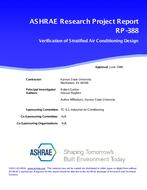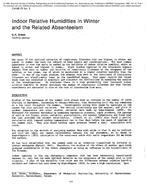The performance of four popular ventilation strategies in ten different U.S. cities for a typical small office building with a single-zone constant-air-volume (CAV) HVAC system is presented in this paper. These ventilation strategies include fixed-rate ventilation, sensible and enthalpy-based air-side economizers, and CO2-based demand-controlled ventilation using an artificial neural network control algorithm. A commercial version of DOE 2.1E (Acrosoft 1994) is used to determine the hour-by-hour non-ventilation loads for a sample office building and the supply airflow rate for its constant air-volume rooftop unit. The weather data and computer models of the different ventilation strategies are then used to find the annual heating and cooling energy consumption in each of the ten cities. Conclusions are drawn on the relative performance of the ventilation strategies in the various climates. Recommendations are made for further study including experimental work and studies of variable air volume with neural network control of outdoor air admission.
Units: Dual
Citation: ASHRAE Transactions, 1998, Vol. 104, Part 2, Toronto, ON
Product Details
- Published:
- 1998
- File Size:
- 1 file , 230 KB
- Product Code(s):
- D-7670


